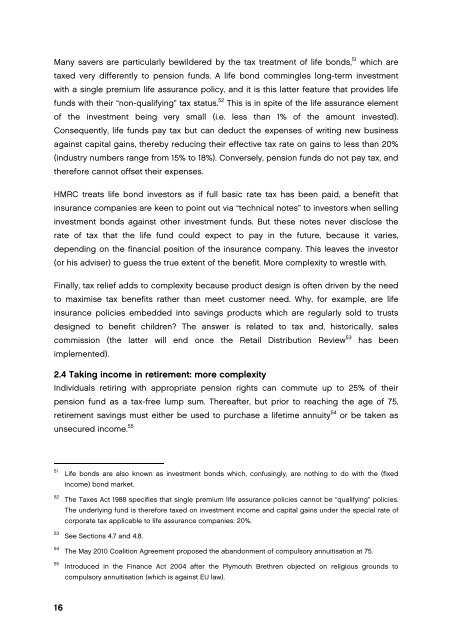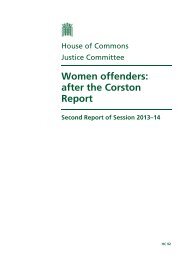Simplification is the key - Centre for Policy Studies
Simplification is the key - Centre for Policy Studies
Simplification is the key - Centre for Policy Studies
You also want an ePaper? Increase the reach of your titles
YUMPU automatically turns print PDFs into web optimized ePapers that Google loves.
Many savers are particularly bewildered by <strong>the</strong> tax treatment of life bonds, 51 which are<br />
taxed very differently to pension funds. A life bond commingles long-term investment<br />
with a single premium life assurance policy, and it <strong>is</strong> th<strong>is</strong> latter feature that provides life<br />
funds with <strong>the</strong>ir “non-qualifying” tax status. 52 Th<strong>is</strong> <strong>is</strong> in spite of <strong>the</strong> life assurance element<br />
of <strong>the</strong> investment being very small (i.e. less than 1% of <strong>the</strong> amount invested).<br />
Consequently, life funds pay tax but can deduct <strong>the</strong> expenses of writing new business<br />
against capital gains, <strong>the</strong>reby reducing <strong>the</strong>ir effective tax rate on gains to less than 20%<br />
(industry numbers range from 15% to 18%). Conversely, pension funds do not pay tax, and<br />
<strong>the</strong>re<strong>for</strong>e cannot offset <strong>the</strong>ir expenses.<br />
HMRC treats life bond investors as if full basic rate tax has been paid, a benefit that<br />
insurance companies are keen to point out via “technical notes” to investors when selling<br />
investment bonds against o<strong>the</strong>r investment funds. But <strong>the</strong>se notes never d<strong>is</strong>close <strong>the</strong><br />
rate of tax that <strong>the</strong> life fund could expect to pay in <strong>the</strong> future, because it varies,<br />
depending on <strong>the</strong> financial position of <strong>the</strong> insurance company. Th<strong>is</strong> leaves <strong>the</strong> investor<br />
(or h<strong>is</strong> adv<strong>is</strong>er) to guess <strong>the</strong> true extent of <strong>the</strong> benefit. More complexity to wrestle with.<br />
Finally, tax relief adds to complexity because product design <strong>is</strong> often driven by <strong>the</strong> need<br />
to maxim<strong>is</strong>e tax benefits ra<strong>the</strong>r than meet customer need. Why, <strong>for</strong> example, are life<br />
insurance policies embedded into savings products which are regularly sold to trusts<br />
designed to benefit children? The answer <strong>is</strong> related to tax and, h<strong>is</strong>torically, sales<br />
comm<strong>is</strong>sion (<strong>the</strong> latter will end once <strong>the</strong> Retail D<strong>is</strong>tribution Review 53 has been<br />
implemented).<br />
2.4 Taking income in retirement: more complexity<br />
Individuals retiring with appropriate pension rights can commute up to 25% of <strong>the</strong>ir<br />
pension fund as a tax-free lump sum. Thereafter, but prior to reaching <strong>the</strong> age of 75,<br />
retirement savings must ei<strong>the</strong>r be used to purchase a lifetime annuity 54 or be taken as<br />
unsecured income. 55<br />
51<br />
52<br />
53<br />
54<br />
55<br />
Life bonds are also known as investment bonds which, confusingly, are nothing to do with <strong>the</strong> (fixed<br />
income) bond market.<br />
The Taxes Act 1988 specifies that single premium life assurance policies cannot be “qualifying” policies.<br />
The underlying fund <strong>is</strong> <strong>the</strong>re<strong>for</strong>e taxed on investment income and capital gains under <strong>the</strong> special rate of<br />
corporate tax applicable to life assurance companies: 20%.<br />
See Sections 4.7 and 4.8.<br />
The May 2010 Coalition Agreement proposed <strong>the</strong> abandonment of compulsory annuit<strong>is</strong>ation at 75.<br />
Introduced in <strong>the</strong> Finance Act 2004 after <strong>the</strong> Plymouth Brethren objected on religious grounds to<br />
compulsory annuit<strong>is</strong>ation (which <strong>is</strong> against EU law).<br />
16

















